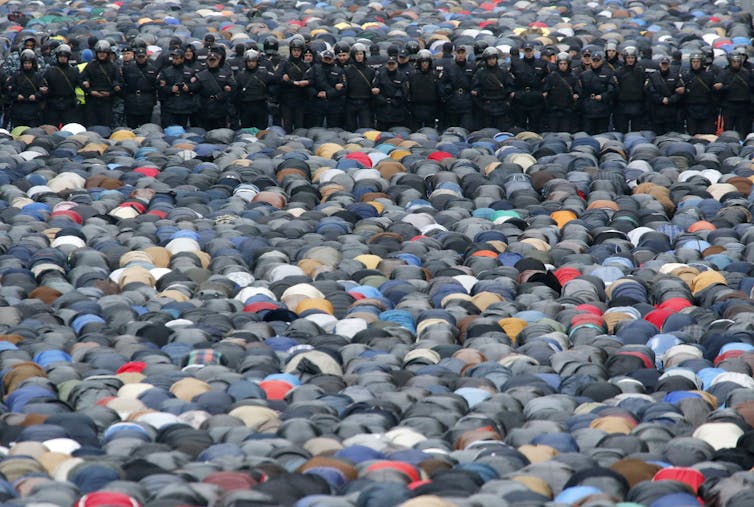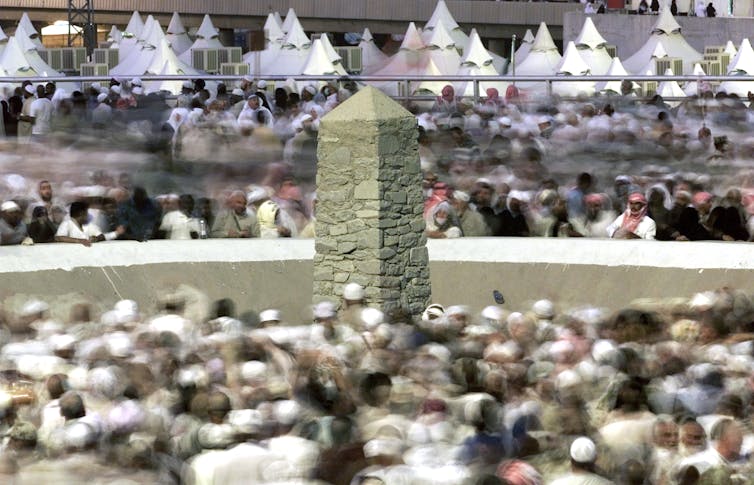Why is Eid celebrated twice a year and how has coronavirus changed the festival?
- Written by Ken Chitwood, Lecturer, Concordia College New York | Journalist-fellow, USC Center for Religion and Civic Culture, Concordia College New York
Editor’s note: At sundown on July 30, Muslims all over the world will celebrate one of the principal festivals, Eid al-Adha. Earlier in May, Muslims celebrated Eid al-Fitr. Ken Chitwood, a scholar of global Islam, explains the two Islamic festivals.
1. What is Eid?
Eid literally means a “festival” or “feast” in Arabic[1]. Eid is celebrated twice a year as Eid al-Adha and Eid al-Fitr.
2. Why is it celebrated twice a year?
The two Eids recognize, celebrate and recall two distinct events that are significant to the story of the Islamic faith.
Eid al-Fitr means “the feast of breaking the fast[2].” The fast, in this instance, is that of Ramadan[3], the holy month observed by Muslims, which recalls the revealing of the Quran to Prophet Muhammad.
 Eid al-Adha Mass prayer.
Sergei Karpukhin/Reuters
Eid al-Adha Mass prayer.
Sergei Karpukhin/Reuters
Eid celebrations can last up to three days. In many countries with large Muslim populations, it is a national holiday. Schools, offices and businesses are closed so family, friends and neighbors can enjoy the celebrations together. In Turkey and in places that were once part of the Ottoman-Turkish empire such as Bosnia and Herzegovina, Albania, Azerbaijan and the Caucasus, it is also known as the “Lesser Bayram[4],” meaning “lesser festival” in Turkish.
The other festival, Eid al-Adha, is the “feast of the sacrifice[5].” It commemorates the end of hajj, an annual pilgrimage by millions of Muslims to the holy city of Mecca in Saudi Arabia that is obligatory once in a lifetime, but only for those with means.
Eid al-Adha recalls the story of how God commanded Ibrahim to sacrifice his son Ismail as a test of faith. A similar story is told of Abraham and Isaac, as they were known, in the Hebrew Torah and Christian Old Testament. As narrated in the Quran, it describes Satan’s attempt to tempt Ibrahim so he would disobey God’s command. Ibrahim, however, remains unmoved and informs Ismail, who is willing to be sacrificed.
But, just as Ibrahim attempts to kill his son, God intervenes and a ram is sacrificed in place of Ismail. This story has institutionalized the practice of sacrifice in Islam and continues to be commemorated each year.
During Eid al-Adha, Muslims slaughter an animal – usually a sheep, goat or cow – to remember Ibrahim’s sacrifice and remind themselves of the need to submit to the will of God. Eid al-Adha is also known as the “Greater Bayram[6].”
3. When are they celebrated?
Eid al-Adha is celebrated on the 10th day of the 12th and final month in the Islamic calendar[7].
Eid al-Fitr is celebrated on the first day of the 10th month in the Islamic calendar[8].
The Islamic calendar[9] is a lunar calendar and dates are calculated based on lunar phases. Due to this, the Islamic calendar year is shorter than the solar Gregorian calendar year by 10 to 12 days.
Thus, Ramadan and Eid “rotate” through the Gregorian calendar and can be celebrated during different seasons in the Southern and Northern hemispheres. In 2019, for example, Eid al-Fitr was celebrated in the U.S. on June 4. In 2020, the date for Eid al-Fitr was 24 May. For Eid al-Adha, the date this year is July 31, beginning at sundown on July 30. In 2019, it fell on August 11.
4. What customs are common during the two Eids?
Eid al-Fitr features two to three days of celebrations that include special prayers[10]. People greet each other with “Eid Mubarak,” meaning “Blessed Eid.” Gifts are given out to the poor before the morning prayers. In addition, Muslims are encouraged to forgive differences and let go of grudges. There are a multitude of other practices that vary from country to country.
On Eid al-Adha, pilgrims in Mecca reenact Ibrahim’s rejection[11] of Satan’s temptation. During the pilgrimage, Muslims cast stones at a pillar, which represents Satan. In remembrance of how Ibrahim was given a ram to sacrifice, they proceed to sacrifice animals.
 Muslim pilgrims ‘stone the devil’ in Mena, outside of Mecca.
Shamil Zhumatov/Reuters
Muslim pilgrims ‘stone the devil’ in Mena, outside of Mecca.
Shamil Zhumatov/Reuters
Those unable to go on the pilgrimage visit mosques and even family gravesites.[12]
5. What is the spiritual meaning of sacrifice during Eid al-Adha?
The sacrifice represents how, like Ibrahim, pilgrims and practicing Muslims worldwide are willing to give up even their most precious possessions[13].
Charity to the poor is a highly emphasized value in Islam. The Quran says[14], “Believe in Allah and his messenger, and give charity out of the (substance) that Allah has made you heirs of. For those of you who believe and give charity – for them is a great reward.”
So, as part of this practice, only around a third of the meat is consumed by the family or group of friends; the rest is given to the poor and needy.
Furthermore, the sacrifice of animals is carried out according to specific instructions[15]. This is all part of the religious and moral obligation of Muslims.
6. What are some of the modern-day challenges?
With more than 2 million visitors normally arriving in Mecca for hajj, the pilgrimage often presents a logistical challenge[16] for countries providing meat for the sacrifice. Saudi authorities strive to find alternative methods[17] of preserving, distributing and dealing with the vast amount of meat that comes from the animal sacrifices.
[Get facts about coronavirus and the latest research. Sign up for The Conversation’s newsletter.[18]]
The coronavirus pandemic has led to a new set of challenges to the celebrations in 2020. Most of all, the hajj pilgrimage has been limited to only those Muslims residing in Saudi Arabia[19]. Additionally, many families are unable to get together for Eid celebrations, due to restrictions on travel and social distancing rules.
Leaders around the world have imposed restrictions on religious gatherings. In Saudi Arabia, for example people are being asked to hold Eid prayers inside mosques[20], rather than outside, which is customary. In the U.S., the Assembly of Muslim Jurists in America issued a fatwa[21] – a formal ruling on a point of Islamic law – dictating that praying be done at home this Eid.
The World Health Organization even issued guidelines for a “Safe Eid[22] addressing social distancing at prayer and public gatherings. It also included best practices for sacrifices and distribution of charity to the poor.
This is an updated version of a piece first published[23] on August 28, 2017.
References
- ^ Eid literally means a “festival” or “feast” in Arabic (books.google.com)
- ^ the feast of breaking the fast (books.google.com)
- ^ Ramadan (theconversation.com)
- ^ Lesser Bayram (oxfordislamicstudies.com)
- ^ feast of the sacrifice (books.google.com)
- ^ Greater Bayram (www.oxfordislamicstudies.com)
- ^ 10th day of the 12th and final month in the Islamic calendar (www.oupjapan.co.jp)
- ^ first day of the 10th month in the Islamic calendar (books.google.com)
- ^ Islamic calendar (referenceworks.brillonline.com)
- ^ special prayers (books.google.com)
- ^ pilgrims in Mecca reenact Ibrahim’s rejection (books.google.com)
- ^ visit mosques and even family gravesites. (books.google.com)
- ^ even their most precious possessions (books.google.com)
- ^ The Quran says (quranexplorer.com)
- ^ according to specific instructions (global.oup.com)
- ^ logistical challenge (tradearabia.com)
- ^ find alternative methods (www.thenational.ae)
- ^ Sign up for The Conversation’s newsletter. (theconversation.com)
- ^ only those Muslims residing in Saudi Arabia (theconversation.com)
- ^ people are being asked to hold Eid prayers inside mosques (www.aljazeera.com)
- ^ the Assembly of Muslim Jurists in America issued a fatwa (www.amjaonline.org)
- ^ Safe Eid (webcache.googleusercontent.com)
- ^ of a piece first published (theconversation.com)
Authors: Ken Chitwood, Lecturer, Concordia College New York | Journalist-fellow, USC Center for Religion and Civic Culture, Concordia College New York

